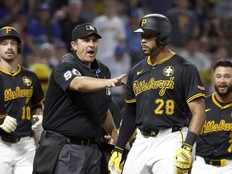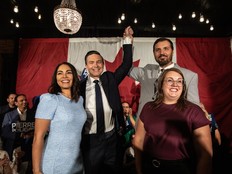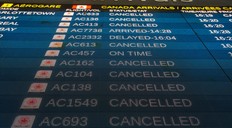Six Secret Service agents suspended in connection with Trump assassination attempt

Article content
The Secret Service suspended six agents in connection with security lapses at the Butler, Pennsylvania, campaign event last year where a gunman wounded then-presidential candidate Donald Trump and killed a rallygoer.
The agents, who were suspended without pay, include some supervisors, according to an official familiar with the matter, who spoke on the condition of anonymity because they were not authorized to discuss the developments. The suspensions range from 10 days to 42 days, the official said Thursday.
News of the suspensions emerged nearly a year after the July 13, 2024, shooting in Butler, which injured Trump and killed an attendee, Corey Comperatore. During the event, 20-year-old Thomas Matthew Crooks was able to fire at Trump from atop a nearby roof. A Secret Service sniper returned fire, killing Crooks.
The Secret Service has faced intense criticism for security at the Butler rally, with an internal assessment concluding that the agency was responsible for stunning lapses in planning and communications. The attack ignited bipartisan outrage, spurred multiple reviews examining security failures and fueled calls for the Secret Service to undergo significant reforms.
Soon after the shooting, Secret Service Director Kimberly Cheatle resigned amid pressure. Her successor, Ronald L. Rowe Jr., served about six months as acting director, and he has acknowledged that the Butler attack “was a failure of the Secret Service” to secure the area or protect Trump.
This year, Trump, who months after the shooting was elected president for a second time, tapped Sean M. Curran – a longtime agent who had headed Trump’s Secret Service detail and helped shield him on the Butler stage – to serve as the agency’s director.
Assessments of the Secret Service’s actions in Butler have been withering, with reviews sharply criticizing the way the agency and its agents behaved before, during and after the shooting.
An internal review found that the Secret Service never directed local police snipers to monitor a nearby rooftop, despite the snipers’ willingness to do so. That review also found that the Secret Service had its own security room that was separate from a command post for Butler County Emergency Services, and also used a different radio frequency from local law enforcement officials, hindering them from rapidly sharing information.
The agency said that following Butler, it imposed a number of reforms, including improving communications with state and local officials and expanding the use of technology, including drones, to better monitor venues.
Another review conducted by an independent panel said the Secret Service needed “fundamental reform to carry out its mission,” which includes providing security for presidents, former leaders and other top U.S. officials.
This bipartisan panel highlighted multiple security breakdowns and found that some agents involved in Butler security were inexperienced. The panel’s review also found that agents “appear to have done little in the way of self-reflection in terms of identifying areas of missteps, omissions, or opportunities for improvement.”











Postmedia is committed to maintaining a lively but civil forum for discussion. Please keep comments relevant and respectful. Comments may take up to an hour to appear on the site. You will receive an email if there is a reply to your comment, an update to a thread you follow or if a user you follow comments. Visit our Community Guidelines for more information.